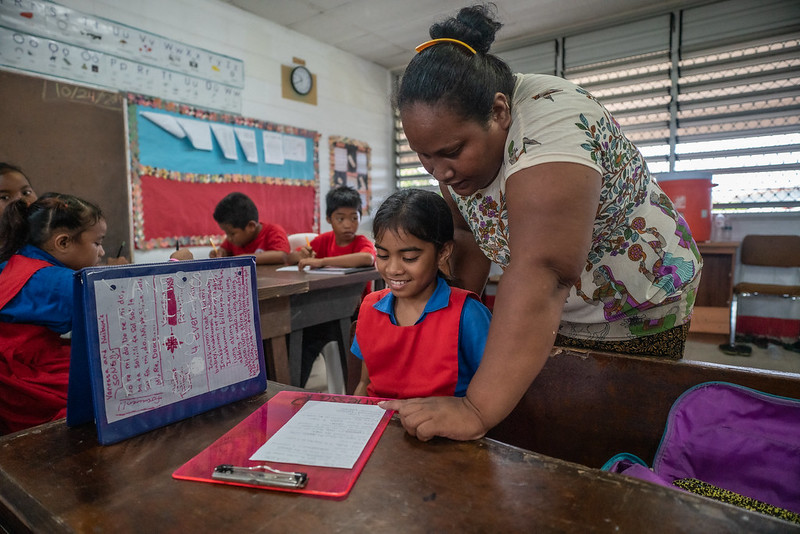Drowning in debt: island states like mine are banking on an international lifeline

The COVID-19 crisis has compounded challenges like climate change, leaving many island nations facing crippling debt, with the future of aid financing unclear – writes Ms Tina Stege, Climate Envoy for the Republic of the Marshall Islands.
Marshallese are a resilient people. We have thrived for thousands of years on low-lying atolls, drawing strength from close-knit communities to face innumerable challenges – an exacting environment, colonialism, World War II, nuclear testing, and climate change.
After months battling a climate-related dengue fever outbreak in 2019, we closed our borders early in the pandemic to protect our overstretched frontline workers and our most vulnerable. The global pandemic underscored a lesson my people learned long ago: we are only as strong as the most vulnerable in our society.
Today, our borders remain closed and the country COVID-free, though at great cost. The projected impact on tax revenues, employment and job loss alongside a gutting of fisheries revenues leaves the Republic of the Marshall Islands (RMI) facing a fiscal shock larger than any experienced before.
As the IMF and World Bank meet this week, we know that their decisions will shape the potential for an economic recovery that is green, that is resilient, and that supports the health and safety of us all. The Marshall Islands, like many other small island developing states at the forefront of climate ambition, stands ready to build back better from COVID-19. But we can’t do it alone.
For countries like mine with climate plans in place, including nationally determined contributions, national adaptation plans, and long-term greenhouse gas reduction strategies, planning for a resilient future means developing projects that put both people and planet at the heart of policies to increase employment, strengthen economies, and protect livelihoods.
But implementing projects like these requires resources. And the COVID-19 crisis has compounded existing challenges, leaving many islands nations facing crippling debt, with the future of aid financing murky and insecure.
The IMF amended its once-dire projections last month – but only for the developed world. Even as she praised the $11 trillion of fiscal measures for boosting recovery in developed states, IMF Managing Director Kristalina Georgieva also said that small, tourism-dependent states are “on their knees”, describing high levels of debt as “suffocating”.
And many of the fiscal measures that have contributed to the developed world’s stability have made our situation worse. More than 50% of public funds in G20 states flowing towards the energy sector since COVID-19 have gone towards fossil fuels. These investment decisions have direct implications for us in rising seas, growing typhoons, and water shortages. Preparing and responding to those events comes at a cost.
Green recovery
To ensure that those most vulnerable are not harmed as we build back from COVID-19, developing countries need adequate resources to implement a green recovery. This will require urgent action by multilateral development banks and other international financial institutions to give states like mine the liquidity to lead the green recovery. It will require urgent debt relief, concessional financing, bilateral aid and climate finance.
Many developing states are ready for a green and resilient recovery that boosts development and saves the planet that we all share – but we can’t do it without support.
Providing such support is a logical choice. As communities have battled the COVID-19 pandemic, we’ve known that those on the frontline – doctors, nurses, carers – are the key to turning the tide against the deadly virus. The same is true for those of us on the frontline of the climate crisis; if you save us, you save the world. And the same is true of our economies: inequality threatens peace and stability, and threatens growth and development.
Small island states are raising their collective voices. Last week, the presidents of Micronesia came together in Palau, where they noted that COVID-19 does not discriminate based on GDP classifications. They agreed to work with banks, donor partners and international financing institutions to implement instruments like debt forgiveness and grace periods in order to lighten the financial burden on Micronesian states.
The Alliance of Small Island States (AOSIS) – made up of 44 small island and low-lying coastal developing states, including the Marshall Islands – have warned in stark terms that the combined pressures of COVID-19 and debt will set development back by decades.
Ensuring that the developing world can build back better is not just an exercise in logical policymaking, but also one of compassion and solidarity. I hope that leaders from donor nations will come together, as island leaders have, to coordinate an effective response to the present crisis. We must stand together as an international community to support one another and ensure that the no country is left behind. Our collective future depends on it.
Image: What future for Marshallese children? Photo of primary school, Majuro, Marshall Islands, courtesy Asian Development Bank
This article first appeared on the Thomson Reuters Foundation website.